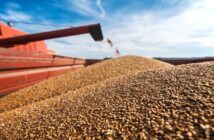“For decades investment in pulse crops has been at a low level. As a result, progress has lagged behind the much larger monoculture crops of cereals and oilseeds,” notes Roger Vickers, chief executive of PGRO. To remedy this imbalance, he proposes increased public research funding to minimise the risk in pulse breeding and production and to encourage further commercial investment.
“Breeding by conventional means requires long-term commitment and a belief that a profitable market will exist. In the same way, developments in crop protection require significant investment in research and registration backed by the assurance of potential profits from crops.
“UK grain and vegetable legume production is largely restricted to peas (Pisum sativum) and beans (Vicia faba), yet there are many other types produced around the world that could be adapted for UK production. Examples include lentils, chickpeas, lupins and phaseolus beans.
“An enhanced impetus for UK vegetable protein production for human consumption would encourage breeding effort to commercialise selections of these types that are suited to the UK’s climate. This in turn would increase their production in the UK, providing new products with environmental and dietary benefits.
“We strongly believe that a clear political direction, with accompanying incentives for greater and more diverse grain legume production in the UK, would encourage longer-term investment from commercial companies throughout the supply chain.
“The many excellent academic researchers in the UK, who have world-leading expertise in legumes, need to be supported by policies directed at the improvement of sustainable productivity, environmentally sympathetic production and legume performance. In this way, they would be able to make an even more significant contribution to increased production efficiency and reliability.
“In addition, associated investment in applied research with partnering organisations, networked for effective knowledge exchange to growers, would achieve rapid results.
“As a prime example, the Canadian model of public funds for public good directed at improving increased and reliable pulse production research has been hugely successful in building a large and vibrant sector in their economy. We propose a similar way forward for the UK pulse crop where genetic improvements, processing and utilisation support, agronomy and sustainable production systems would be key target areas for support,” adds Mr Vickers.




